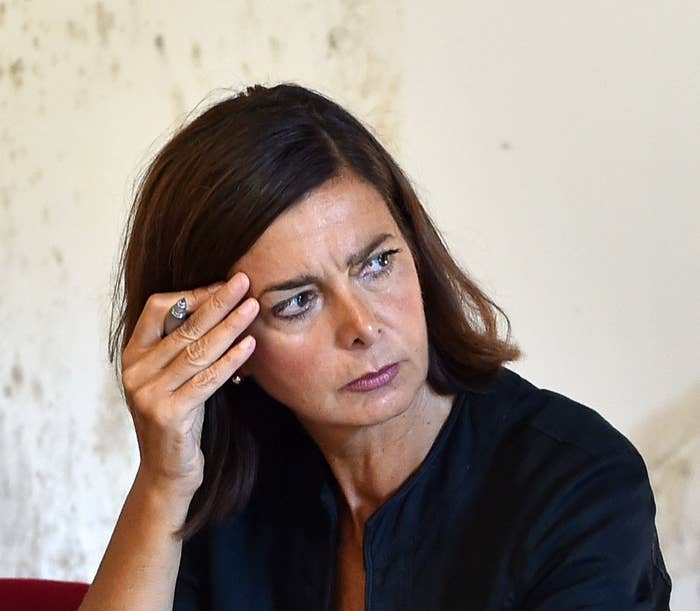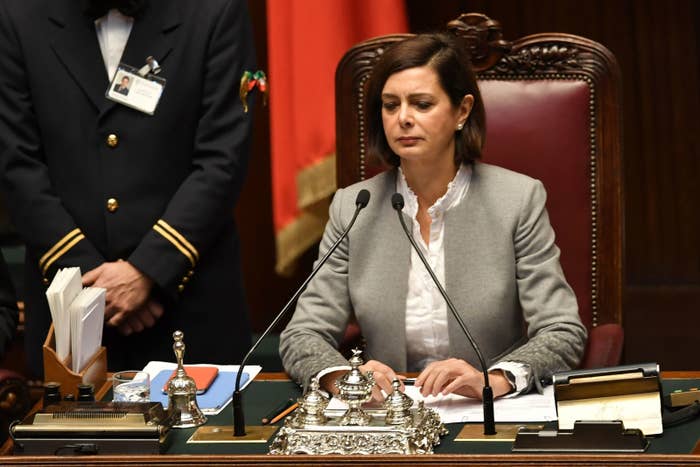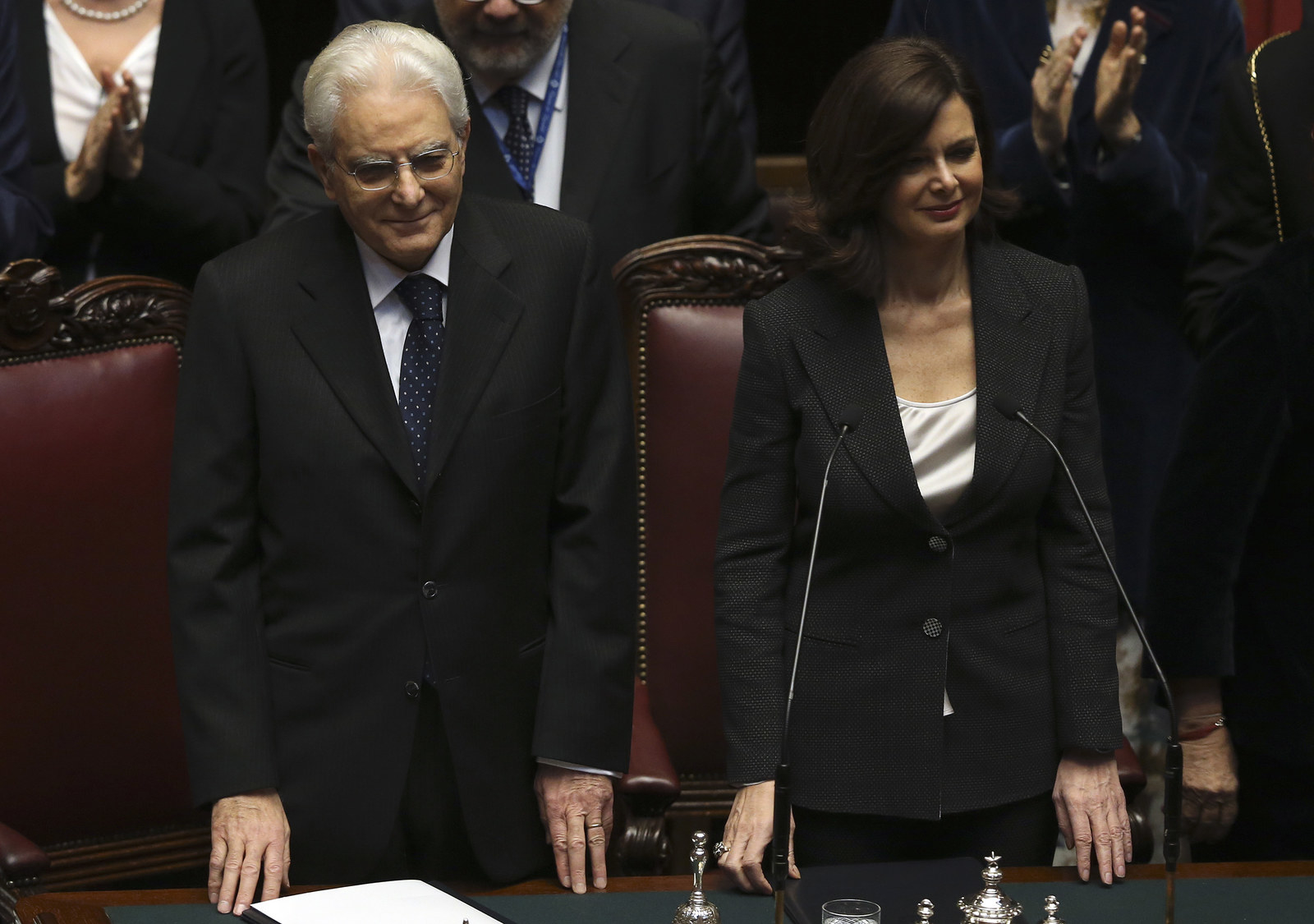
The surge in fake news is acting as a gateway to online hate and risks "short-circuiting democracies", Laura Boldrini, the president of the Italian Chamber of Deputies, has warned in an interview with BuzzFeed News.
Boldrini, the politically neutral speaker of the lower house of Italy's parliament, is launching a campaign this week to raise awareness about disinformation and its consequences. She has repeatedly been on the receiving end of violent online abuse threatening her with rape and murder.
“Fake news has always existed, but online its impact is potentially boundless," she told BuzzFeed News. "The most worrying aspect is that fake news, whether it’s driven by profit or as political propaganda, is all too often an antechamber to hate.
"It is the combination between fake news that targets adversaries, and the hate this enables, that risk short-circuiting our democracies. It not only pollutes the debate, but it may distort how consensus is built.”
She added: “And in some cases, like the murder of the young Labour MP Jo Cox, the line between online and offline violence becomes very thin."
Boldrini is keen to stress that the campaign she is launching is not political, nor directed at any one party, but born out of concern that in the longer term, fake news and disinformation risk undermining the foundations of a functioning democracy.
“Being informed is a right, while being misinformed is dangerous," she said. "It is an issue that concerns every citizen and touches upon a fundamental democratic principle: the right to correct information. Fake news stories are not just some prank – they can cause real damage.
"Just think about stories that refer to vaccinating children, or improvised medical treatments, or online frauds. All too often lies presented as news only aim to delegitimise and throw mud at the reputation of people and institutions."
“This problem has nothing to do with freedom of expression. It would be like saying you can sell stale meat or contaminated water because we’re in a free market,” she said, adding that “when a post claiming the state manipulates information about the intensity of an earthquake goes viral, and thousands of people believe it, it creates social tension and panic. The aim of this campaign is to highlight the scale of these issues because they should not be underestimated.”

Fighting against online hate is a battle Boldrini takes to heart. Last November, on the International Day for the Elimination of Violence Against Women, she shared on Facebook and Twitter some examples of the abuse she regularly receives online.
“Boldrini you are a whore”, “why hasn’t anyone killed this terrorist???”, “I would slap your face with my cock!!!”, and “I want to cut open your brain and piss in it” were just some of the messages she received.
Boldrini captioned her tweet with a simple question: “Do you believe this is freedom of expression?”
Secondo voi questa è libertà di espressione? https://t.co/7mpbqlwZug #noallaviolenzasulledonne
“I chose that very specific day to name and shame some of the authors of the violent messages, threats, and sexual innuendo that I constantly receive on my social media profiles every single day," she told BuzzFeed News.
"I want to say this very clearly because it is a point that I take to heart: It is unacceptable that women, after numerous battles to defend our rights and gain respect, now find ourselves constantly insulted and abused online, often having to face a choice: accept this kind of humiliation or stay away from the internet. I did it for the many women who silently accept all this simply because they don’t have the strength or profile to speak out."
Boldrini said social media platforms such as Facebook need to do more, especially when it comes to hateful messages that are being shared on their platforms.
“If a newspaper publishes a fake news story that Facebook then amplifies, the initial responsibility is of course the newspaper’s," she said. "It should verify its sources. That said, Facebook needs to do more than just limit itself to proclamations and good intentions.”
Boldrini cited the story of a young woman called Arianna Drago that she shared on Facebook two weeks earlier: "She had the courage to publish comments that were being made in private Facebook groups about young women. The comments were appalling, sexual, and vulgar, and made about women whose photos were being shared, without their knowledge, in these groups.
“Drago reported the groups to Facebook. The social network deleted her account, and left the groups open. Incredulous by what happened, she wrote to me, and I shared her story and complaint.”
A number of the posts in the above Facebook comments allude to violent acts, including rape.
According to an Italian newspaper, Facebook has since apologised. As well as reinstating Drago’s account, which it claims was deactivated by mistake, the company said it had deleted the groups in question.
But Boldrini said many violent groups still exist on the site.
"My question is this: What are Facebook’s policies? Whose side is Facebook on? It is sad and worrying that the company of a young entrepreneur like Mark Zuckerberg, who claims to defend the rights of an open society where nobody is discriminated against, deletes a profile like Arianna's but allows such obscenity, sexism and misogyny, which scars the dignity of women, to exist on its website."
Before entering parliament in 2013, Boldrini worked at the UN High Commissioner for Refugees and the Food and Agriculture Organization. She has been deployed on missions in former Yugoslavia, Afghanistan, Pakistan, Iraq, Mozambique, Angola, and Rwanda.
As in the US, where a BuzzFeed News analysis found that the most viral fake election news stories outperformed real news on Facebook, fake news came to prominence in Italy during a recent election. In the wake of a constitutional referendum last December than cost the then prime minister Matteo Renzi his job, one analysis found that among the most shared referendum news stories many of the top articles were fake news.
Boldrini's campaign, “Basta Bufale” (“Enough with the fake news”), is being launched at a time when trust in traditional parties, institutions, and media in Italy is lower than elsewhere in Europe and public opinion in the country is increasingly polarised.
“It is true that in Italy, like in many other countries, there is widespread distrust towards institutions and politics," Boldrini said. "At the same time, an increasing number of people tend to not trust traditional news sources. Online, many seek to confirm whatever their bias may be, often ignoring facts. All this leads to an increasingly polarised debate and echo chambers where everyone just shouts and doesn’t listen to other points of view.
“In this context, the risk is that people share fake news that aligns to their world view, and everyone just shouts over each other. There is no dialogue or a real exchange of opinions. This worries me greatly because it risks quashing democratic confrontation."
Last month, the co-founder of the anti-establishment and populist Five Star Movement (M5S) Beppe Grillo (who like Donald Trump is constantly accusing mainstream media of producing fake news), called on the creation of a jury of randomly selected members of the public to judge the veracity of news stories published by the media. Grillo and the M5S have also accused anyone attempting to tackle or disincentive disinformation and fake news as wanting to clamp down on freedom of expression.
Meanwhile, others in Italy have suggested that regulation, and possibly state intervention, is the solution to beating fake news.
Boldrini rejected both ideas: “I don’t know if fake news had an impact on the outcome of the US election, but I do believe that before any legislative solution is adopted, we should give people the opportunity to understand the issue, and provide them with the necessary tools. The answer should not be a 'state authority against fake news', nor a 'people’s tribunal', as some have suggested in Italy."

Separate analysis published by BuzzFeed News last year revealed that among those publishing and sharing fake news and hyperpartisan content in Italy are websites and social media accounts directly linked to the M5S.
Though she doesn't name any specific political party, the speaker of the chamber claims that “political parties that spread fake news and disinformation demonstrate that they are prepared to do anything and have no ethical qualms. Untruths and deception as political tools are the worst kind of politics.”
Beyond the appeal, Boldrini’s broader effort to battle disinformation is a focus on education.
“We need to start from schools and universities, and insist on a formation that helps young people to distinguish between credible sources and less reliable ones, as well as help to develop critical judgment and a verification culture and skills-set,” Boldrini said, citing an “internet committee” of MPs and experts that she has set up. Among its tasks: MPs and experts are going into schools across the country to teach students and teachers how to use the internet more responsibly.
